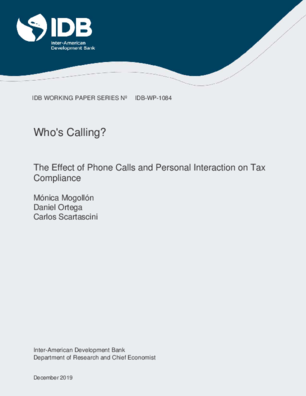Who's Calling?: The Effect of Phone Calls and Personal Interaction on Tax Compliance
Date issued
Dec 2019
Journal version
Summary
Subject
Tax Compliance;
Tax Policy;
Fiscal Policy;
Behavioral Economics;
Tax Evasion;
Impact Evaluation;
Randomized Controlled Trial
JEL code
C93 - Field Experiments;
H23 - Externalities • Redistributive Effects • Environmental Taxes and Subsidies;
H42 - Publicly Provided Private Goods;
D62 - Externalities
Country
Colombia
Category
Working Papers
Most tax agencies use letters as the method of communicating with taxpayers. Still, other technologies exist that could be more effective. This paper reports the results of a field experiment conducted by the National Tax Agency of Colombia (DIAN), using phone calls to reduce tax delinquencies. DIAN randomly assigned 34,000 tax debtors to a phone call operation using a fixed script to discuss existing debts and invite taxpayers to a meeting at the local tax agency oce. Phone calls were very effective in increasing collection of unpaid taxes. Conditional on the phone call being made, the effect on the treatment is about 25 percentage points higher than the control group (about a five-fold increase). We also nd suggestive evidence that the personal interaction seems to be an important channel for explaining taxpayers' behavior. Faced with a tax agent, taxpayers tend to commit to attending the meeting and paying the tax owed. However, many taxpayers who commit do not make payment effective. The findings complement a nascent literature that shows that there are plenty of gains from innovating in communication strategy. They also indicate that personal interactions are important, but they have to be paired with easy-to-follow and immediate actions. Paying taxes is easier said than done.
Generative AI enabled




